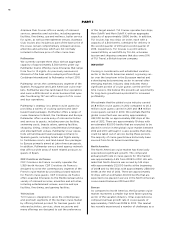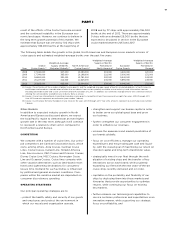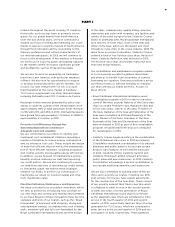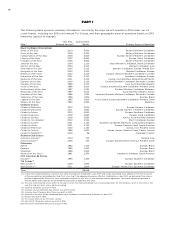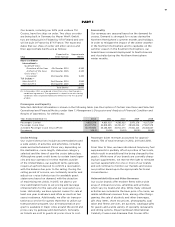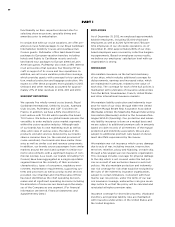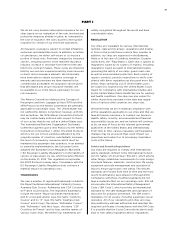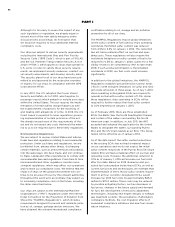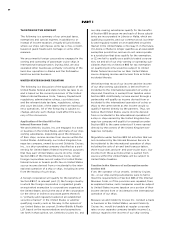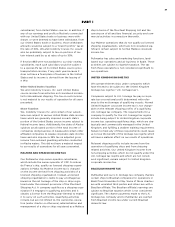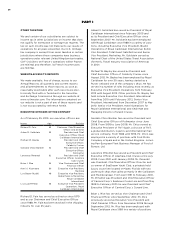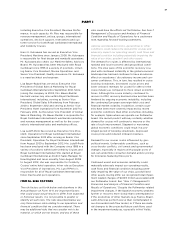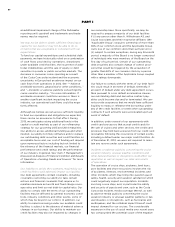Royal Caribbean Cruise Lines 2012 Annual Report Download - page 25
Download and view the complete annual report
Please find page 25 of the 2012 Royal Caribbean Cruise Lines annual report below. You can navigate through the pages in the report by either clicking on the pages listed below, or by using the keyword search tool below to find specific information within the annual report.
21
PART I
We do not carry business interruption insurance for our
ships based on our evaluation of the risks involved and
protective measures already in place, as compared to
the cost of insurance. We carry business interruption
insurance for certain of our shoreside operations.
All insurance coverage is subject to certain limitations,
exclusions and deductible levels. In addition, in certain
circumstances, we either self-insure or co-insure a
portion of these risks. Premiums charged by insurance
carriers, including carriers in the maritime insurance
industry, increase or decrease from time to time and
tend to be cyclical in nature. These cycles are impacted
both by our own loss experience and by losses incurred
in direct and reinsurance markets. We historically
have been able to obtain insurance coverage in
amounts and at premiums we have deemed to be
commercially acceptable. No assurance can be given
that affordable and secure insurance markets will
be available to us in the future, particularly for war
risk insurance.
The Athens Convention relating to the Carriage of
Passengers and their Luggage by Sea (1974) and the
1976 Protocol to the Athens Convention are generally
applicable to passenger ships. The United States has
not ratified the Athens Convention; however, with lim-
ited exceptions, the 1976 Athens Convention Protocol
may be contractually enforced with respect to those
of our cruises that do not call at a United States port.
The International Maritime Organization Diplomatic
Conference agreed upon a new Protocol to the Athens
Convention on November 1, 2002. The 2002 Protocol,
which is not yet in force pending ratification by the
requisite number of countries, substantially increases
the level of compulsory insurance which must be
maintained by passenger ship operators. In an attempt
to expedite implementation, the European Union
adopted the European Union Regulation 392/2009
(“EU Passenger Liability Regulation”) on the liability of
carriers of passengers by sea, which became effective
on December 31, 2012. This regulation incorporates
the 2002 Protocol in many ways. Compliance with the
EU Passenger Liability Regulation does not have a
material impact on operating costs.
TRADEMARKS
We own a number of registered trademarks related to
the Royal Caribbean International, Celebrity Cruises,
Azamara Club Cruises, Pullmantur and CDF Croisières
de France cruise brands. The registered trademarks
include the name “Royal Caribbean International”
and its crown and anchor logo, the name “Celebrity
Cruises” and its “X” logo, the name “Azamara Club
Cruises” and its logo, the names “Pullmantur Cruises”
and “Pullmantur” and their logos, the name “CDF
Croisières de France” and its logo, and the names of
various cruise ships. We believe our trademarks are
widely recognized throughout the world and have
considerable value.
REGULATION
Our ships are regulated by various international,
national, state and local laws, regulations and treaties
in force in the jurisdictions in which they operate. In
addition, our ships are registered in the Bahamas,
Malta or in the case of Celebrity Xpedition, Ecuador
(collectively, the “Flag States”). Each ship is subject to
regulations issued by its country of registry, including
regulations issued pursuant to international treaties
governing the safety of our ships, guests and crew
as well as environmental protection. Each country of
registry conducts periodic inspections to verify com-
pliance with these regulations as discussed more fully
below. Ships operating out of United States ports
are subject to inspection by the United States Coast
Guard for compliance with international treaties and
by the United States Public Health Service for sanitary
and health conditions. Our ships are also subject to
similar inspections pursuant to the laws and regula-
tions of various other countries our ships visit.
We believe that we are in material compliance with
all the regulations applicable to our ships and that we
have all licenses necessary to conduct our business.
Health, safety, security, environmental and financial
responsibility issues are, and we believe will continue
to be, an area of focus by the relevant government
authorities in the United States and internationally.
From time to time, various regulatory and legislative
changes may be proposed that could impact our
operations and subject us to increasing compliance
costs in the future.
Safety and Security Regulations
Our ships are required to comply with international
safety standards defined in the International Conven-
tion for Safety of Life at Sea (“SOLAS”), which among
other things, establishes requirements for ship design,
structural features, materials, construction, life saving
equipment and safe management and operation of
ships to ensure guest and crew safety. The SOLAS
standards are revised from time to time and the most
recent modifications were phased in through 2010.
Compliance with these modified standards did not
have a material effect on our operating costs. SOLAS
incorporates the International Safety Management
Code (“ISM Code”), which provides an international
standard for the safe management and operation of
ships and for pollution prevention. The ISM Code is
mandatory for all vessels, including passenger vessel
operators. All of our operations and ships are regu-
larly audited by national authorities and maintain the
required certificates of compliance with the ISM Code.
It is possible that the Costa Concordia incident could
lead to new safety legislation and/or regulations.



